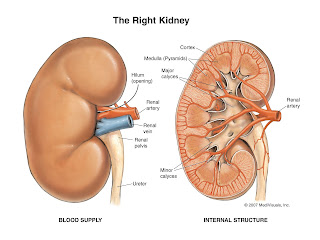(End Stage Renal Disease)

ESRD can is caused by Acute (sudden) kidney failure is the sudden loss of the ability of the kidneys to remove waste and concentrate urine without losing electrolytes[For more information click HERE]
The National Kidney Foundation estimates that about 350,000 people in the United States have end-stage renal disease and about 67,000 people die of kidney failure every year. In addition there are thousands of people who remain undiagnosed. It is estimated that less then half of the people who have chronic kidney failure are aware that they have impaired kidney function. Chronic kidney disease is a silent disease. There are very few symptoms, the major symptom which really only shows up at the highest level of impairment is fatigue, but with a steady decrease in function over time the onset may be so subtle as to be easily dismissed as something else entirely.
Everyone should get their kidney function checked, especially those who are at high-risk (people who have high blood pressure, diabetes, and people with common symptoms). March is now National Kidney Month to raise awareness of kidney failure and provide an opportunity for people to get checked. Many doctors have started to offer free testing for kidney failure during March.
Common Symptoms
- Bloody stools
- Breath odor
- Bruising easily
- Changes in mental status or mood
- Decreased appetite
- Decreased sensation, especially in the hands or feet
- Fatigue
- Flank pain (between the ribs and hips)
- Hand tremor
- High blood pressure
- Metallic taste in mouth
- Nausea or vomiting, may last for days
- Nosebleeds
- Persistent hiccups
- Prolonged bleeding
- Seizures
- Slow, sluggish movements
- Swelling - generalized (fluid retention)
- Swelling of the ankle, foot, and leg
- Urination changes:
- Decrease in amount of urine
- Excessive urination at night
- Urination stops completely
- Decrease in amount of urine
Signs and tests
The results of laboratory tests may change suddenly (within a few days to 2 weeks). Such tests may include:
A kidney or abdominal ultrasound is the preferred test for diagnosing kidney failure, but abdominal x-ray, abdominal CT scan, or abdominal MRI can tell if there is a blockage in the urinary tract.
Blood tests may help reveal the underlying cause of kidney failure. Arterial blood gas and blood chemistries may show metabolic acidosis.
Treatment
End-stage renal disease cannot be treated with conventional medical treatments such as drugs. Only 2 treatments allow you to continue living when your kidneys stop functioning: dialysis and kidney transplantation.- Dialysis is the term for several different methods of artificially filtering the blood. People who require dialysis are kept alive but give up some degree of their freedom because of their dialysis schedule, fragile health, or both.
- Kidney transplantation means replacement of the failed kidneys with a working kidney from another person, called a donor. Kidney transplantation is not a complete cure, although many people who receive a kidney transplant are able to live much as they did before their kidneys failed. People who receive a transplant must take medication and be monitored by a physician who specializes in kidney disease (nephrologist) for the rest of their lives.
